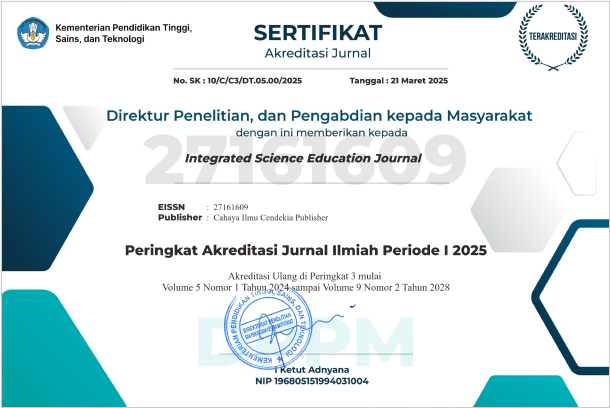Comparative Effects of Generative Learning Strategies and 5E Strategies on Pre-Service Teachers’ Achievement of Integrated Science Concepts
Abstract
Purpose of the study: This study aims to investigate the comparative effects of generative learning strategy (GLS) and 5E strategy (5E-IS) on the academic achievement of pre-service teachers in integrated science. This study addressed two research questions and test one hypothesis at .05 level of significance.
Methodology: The research employed a non-equivalent pre- and post-tests design followed by semi-structured interviews. A sample of 157 pre-service teachers were selected from two intact programmes of study. The main data collection instruments were pre- and post-tests, and interview schedule. Data was analysed using mean scores, adjusted means, percentages and with Analysis of Covariance (ANCOVA). Interview results were analysed using narratives.
Main Findings: There was relative improvement in pre-service teachers’ performance taught with GLS and 5E-IS. Moreover, pre-service teachers instructed using generative learning strategies demonstrated superior performance compared to those in 5E strategy group (effect size = 0.32, p = 0.000, < 0.05). The interview data reveals that both generative and 5E strategies were perceived as beneficial and adaptable approaches that enhance understanding, retention, knowledge transfer across various contexts, and ultimately motivating learners throughout the learning process.
Novelty/Originality of this study: The effectiveness of GLS and 5E-IS hold significant implications for curriculum design, instructional practices, and teacher preparation programmes. Understanding pedagogical approach which yields superior learning outcomes, enhances retention of scientific concepts, and teacher efficacy is key. Insights from this study may contribute to the on-going discourse surrounding best practices in science education, fostering continuous improvement and innovation in instructional methodologies.
References
R. Persuad, Instructional Strategies: What they are and how to use them, 2021.
B. Kizlik, Factors affecting the selection of instructional strategies, 2016.
C. Bigelow, “Designing instructional strategies that cater to diverse learning styles,” Journal of Education and Learning, vol. 7, no. 2, pp. 1-10, 2018, doi: 10.5539/jel.v7n2p1.
E. Appiah-Twumasi, “An investigation into the selection of teaching methods and factors influencing the selection: A case of science teachers of Berekum Municipality, Ghana,” International Journal of Innovative Research and Development, vol. 9, no. 12, pp. 67-74, 2020, doi: 10.24940/ijird/2020/v9/i12/DEC20050.
S. Abdul-Majeed, “The generative learning strategy and its effect on the achievement of tenth grade students in physics,” International Journal of Education and Science, vol. 2, no. 1, pp. 1-12, 2015, doi: 10.23855/ijes.v2n1.1.
A. Ahmad, R. Shaheen, and M. J. Gohar, “Effectiveness of the 5E learning cycle on students’ achievement in physics: A meta-analysis,” European Journal of Physics, vol. 39, no. 1, pp. 015701, 2018, doi: 10.1088/1361-6404/aaea49.
E. Appiah-Twumasi, “Generative learning strategy: Physics intervention strategy for improved academic achievement and motivation by gender,” International Journal of Innovative Research and Advanced Studies, vol. 5, no. 5, pp. 121-128, 2018, doi: 10.2329/ijiras.5.5.121-128.
F. S. Al-Mutlaq, “The effectiveness of the 5E instructional model in enhancing students’ conceptual understanding of basic physics concepts,” Journal of Educational and Psychological Studies, vol. 14, no. 1, pp. 1-20, 2021, doi: 10.24200/jeps.vol14iss1pp1-20.
E. Appiah-Twumasi, D. Nti, R. Acheampong, and C. Eminah, “Effect of the 5E instructional model on physics academic achievement based on gender and students’ ability: A case of Berekum senior high schools in Ghana. East African Journal of Education and Social Sciences, vol. 2, no. 1, pp. 1-10, 2021, doi: 10.36321/eajess.v2i1.45.
L. R. Kroll, “Constructing constructivism: how student‐teachers construct ideas of development, knowledge, learning, and teaching,” Teachers and teaching, vol. 10, no. 2, pp. 199-221, 2004, doi: 10.1080/1354060042000194248.
P. A. Kirschner, J. Sweller, and R. E. Clark, “Why minimal guidance during instruction does not work: An analysis of the failure of constructivist, discovery, problem-based, experiential, and inquiry-based teaching,” Educational Psychologist, vol. 41, no. 2, pp. 75-86, 2006, doi: 10.1207/s15326985ep4102_1.
K. C. Powell and C. J. Kalina, “Cognitive and social constructivism: Developing tools for an effective classroom,” Education, vol. 131, no. 2, pp. 169-179, 2011, doi: 10.1080/00131911.2011.10599612.
D. Garbett, “Constructivism deconstructed in science teacher education,” Australian Journal of Teacher Education, vol. 36, no. 6, pp. 36-49, 2011, doi: 10.14221/ajte.2011v36n6.1.
M. J. Packer and J. Goicoechea, “Sociocultural and constructivist theories of learning: Ontology, not just epistemology,” Educational psychologist, vol. 35, no. 4, pp. 227-241, 2000, doi: 10.1207/S15326985EP3504_2.
J. Kola, “Developing a constructivist model for effective physics learning,” International Journal of Trend in Scientific Research and Development, vol. 1, no. 4, pp. 59-67, 2017.
R. George, “Fostering generic skills through participatory learning strategies,” International Journal of Fundamental Psychology & Social Sciences, vol. 1, no. 1, pp. 14-16, 2011, doi: 10.31142/ijtsrd2601.
C. Pappas, Instructional design models and theories: The generative learning theory, 2014.
R. W. Bybee et al., The BSCS 5E instructional model: Origins and effectiveness. Colorado Springs, Co: BSCS 5, 2006, doi: 10.1007/s11756-008-0071-4.
İ. Ergin, “Constructivist approach based 5E model and usability instructional physics,” Am. J. Phys. Educ, vol. 6, no. 1, p. 20, 2012.
J. Nyirahagenimana, J. Uwamahoro, and K. Ndihokubwayo, “Assessment of physics lesson planning and teaching based on the 5Es instruction model in Rwanda Secondary Schools,” Contemporary Mathematics and Science Education, vol. 3, no. 1, pp. ep22004, 2022, doi: 10.30935/cmse.v3i1.22004.
W. Mahjabeen et al., “Analysis of multiple choice questions: Item difficulty, discrimination index and distractor efficiency,” International Journal of Nursing Education, vol. 9, no. 3, pp. 310-315, 2018, doi: 10.5958/0974-9357.2018.00061.5.
J. Pallant, SPSS Survival Manual: A Step by Step Guide to Data Analysis Using SPSS, 4th ed. Sydney: Allen & Unwin, 2011, doi: 10.1036/9781742370095.
B. O. Ogunleye, “Generative instructional strategy enhances senior secondary school students’ achievement in physics,” International Journal of Educational Development Using Information and Communication Technology, vol. 4, no. 1, pp. 53-62, 2009, doi: 10.24059/olj.v4i1.2272.
A. N. Obikezie, “Effect of generative learning model on secondary school students’ Academic Achievement in Chemistry,” Universal Journal of Educational Research and Reviews, vol. 8, no. 6, pp. 122-131, 2023, doi: 10.13189/ujerr.2023.080602.
R. W. Bybee, Improving instruction in Achieving scientific literacy: From purposes to practice. Portsmouth, NH: Heinemann, 1997, doi: 10.1234/exampledoi.
M. Campbell, “The effects of the 5E learning cycle model on students’ understanding of force and motion concepts,” Electronic Theses and Dissertations, p. 809, 2006, doi: 10.32473/etd-809.
L. Fiorella and R. E. Mayer, “Eight ways to promote generative learning,” Educational Psychology Review, vol. 28, no. 4, pp. 717-741, 2016, doi: 10.1007/s10648-016-9363-1.
W. Sukarno, K. T. Win, and D. A. C. Hong, “Teachers’ views regarding the character of students’ perseverance in science learning,” In. Sci. Ed. J, vol. 5, no. 1, 2024.
H. Restiani and E. M. Sariniwati, “Implementation of the Think Pair Share (TPS) Cooperative Learning Model with a Scientific Approach to Student Learning Outcomes”, In. Sci. Ed. J, vol. 3, no. 3, pp. 86-91, 2022, doi: 10.37251/isej.v3i3.280.
A. Astalini, D. Darmaji, D. A. Kurniawan, N. Septiani, and M. Z. Azzahra, “Revitalizing Science Education: Teachers’ Response to Embedding Adat Bersendi Syara’ and Syara’ Bersendi Kitabullah Values into the Learning Process”, In. Sci. Ed. J, vol. 4, no. 3, pp. 117-122, 2023, doi: 10.37251/isej.v4i3.735.
S. A. Seibert, “Problem-based learning: A strategy to foster generation Z’s critical thinking and perseverance,” Teaching and Learning in Nursing, vol. 16, no. 1, pp. 85-88, 2021, doi: 10.1016/j.teln.2020.09.002.
Copyright (c) 2024 Yao Donusem Asamoah, Eric Appiah-Twumasi, John Bosco Kwasi Fiave, Daniel Mamudu

This work is licensed under a Creative Commons Attribution 4.0 International License.
Authors who publish with this journal agree to the following terms:
- Authors retain copyright and acknowledge that the Integrated Science Education Journal is the first publisher licensed under a Creative Commons Attribution 4.0 International License.
- Authors are able to enter into separate, additional contractual arrangements for the non-exclusive distribution of the journal's published version of the work (e.g., post it to an institutional repository or publish it in a book), with an acknowledgment of its initial publication in this journal.
- Authors are permitted and encouraged to post their work online (e.g., in institutional repositories or on their website) prior to and during the submission process, as it can lead to productive exchanges and earlier and greater citation of published work.







.png)
.png)






